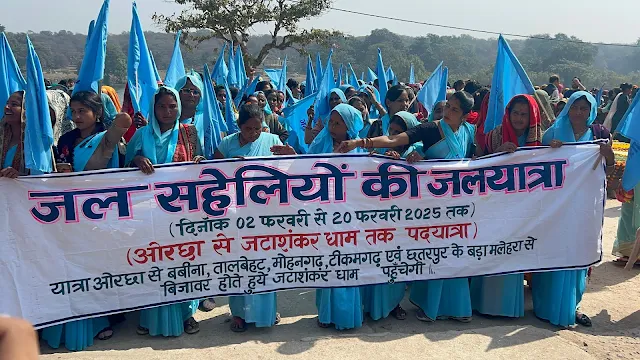Bundelkhand region in Central India, comprising 14 districts of Uttar Pradesh and Madhya Pradesh, has often been in the news due to water scarcity but at the same time it should be emphasized that this region has important assets and strengths which if tapped properly can end this scarcity. However the solutions must be based on several specific features of the region and a lot can be learnt from traditional wisdom of conserving water and collecting water, particularly in tanks. A significant number of such tanks go back about a thousand years to the times of Chandela kings.
It has been learnt in the course of finding the most cost-effective and sustainable methods of water conservation here that the restoration of several of these damaged and depleted water sources provides one of the best ways of meeting the water needs of Bundelkhand region. Another good option is to revive and rejuvenate several small rivers which used to be the lifeline for many remote villages but have been harmed to the extent of almost vanishing due to over-exploitation, excessive sand-mining, encroachments and other factors.
Parmarth is a leading voluntary organization of the region which has worked in cooperation with the government and local communities to improve water conservation in about 100 villages, helping to renovate about 100 tanks, apart from taking up the rejuvenation of six small rivers. An important plank of this work has been the mobilization of women water volunteers called jal sahelis, recognized by their sky blue dress, who have been involved in several important initiatives of river rejuvenation and tank restoration, apart from improving water supply and sanitation.
Now these jal sahelis have got together to take out a yatra or march from Orchha to Jaishankar Dhaam, covering about 300 km. distance in five districts—Niwari, Tikamgarh and Chhatarpur in Madhya Pradesh, and Jhansi and Lalitpur in Uttar Pradesh. This march is to continue from February 2 to February 19.
While nearly 150 Jal Sahelis are determined to cover the entire distance, several others join them for shorter intervals. At various places along the route jal chaupals or water dialogues are organized in which various aspects of water conservation are discussed. The jal sahelis tell about their own work and learn about local initiatives. In the process information about the local water sources is also collected along with suggestions regarding what kind of improvement efforts are needed. Such detailed information collected on the basis of inter-actions with local people can be very useful later for improvement or restoration work. What is more, whenever time permits, some shramdan or contribution of voluntary work is also performed for the cleaning or improving of water sources.
All this has attracted a lot of attention and support from villages which are on the path of the march or else are located close by. Morale during the initial days of the march so far has been very high.
These marches can be a very good way of taking the message of water conservation to many more people in remote villages and also to spread inspirational information regarding some of the remarkably successful efforts of villagers and particularly village women in the recent past. These can lead to more such efforts by other people. When those who have been a part of such efforts themselves go to the people of various villages to relate these, people in similar conditions can relate to them and their experiences and ask them eagerly about more details of their inspiring work, then the chances are very high that this kind of very useful and inspiring work is likely to spread further. So it is not surprising that this march has raised high hopes within a few days.
It is really a remarkable achievement that these women not only contributed voluntary work earlier but in addition have also found the time and the energy to come out for a much longer period, despite many farm and family responsibilities, for a wider social cause. Such efforts should be widely encouraged.
---
The writer is Honorary Convener, Campaign to Save Earth Now. His recent books include Planet in Peril, Protecting Earth for Children, A Day in 2071, and Man over Machine


Comments